Zimbabwe's Manmade Crisis March 12, 2003
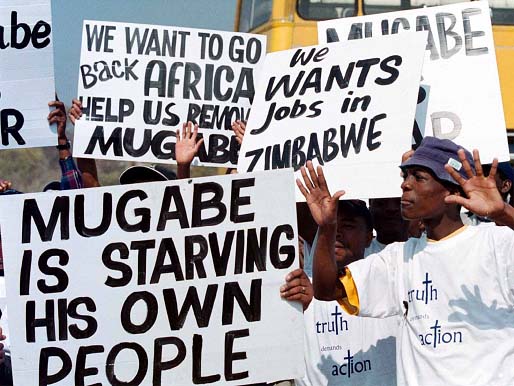
© AP Photo
Executive Summary
Zimbabwe is in crisis. Half the population is facing the threat of famine, hundreds of thousands of people have been displaced, 80% of adults are unemployed, and the rule of law has been replaced by the arbitrary and brutal rule of a self-appointed elite.
The roots of this catastrophe lie in the actions taken by President Mugabe and his inner circle within the ruling party, the Zimbabwe African National Union-Patriotic Front (ZANU-PF). Although Zimbabwe’s drought and the legacy of the colonial past represent serious challenges, the people of Zimbabwe should have been able to overcome them. Instead, their freedoms have been curtailed, their economic opportunities have been wasted, and their common heritage has once again been monopolized by a privileged minority.
Many brave Zimbabweans have spoken out against the violence, corruption and mismanagement of their illegitimate government. Some have been murdered; others have been tortured and imprisoned. Many have been forced into exile out of fear for their lives or the need to continue to feed their children. Still others have remained behind in Zimbabwe, risking their lives to serve as witnesses to a revolution betrayed by some of its own authors.
Their heroic struggle is not about foreign values or foreign interests; it is about their dream of a Zimbabwe that reflects the highest ideals of both traditional and modern Africa.
A Constitution Hijacked
Through great sacrifice, the people of Zimbabwe won their independence in 1980. The struggle for liberation was carried out through armed resistance and a new democratic era began with the adoption of the Constitution. This document replaced the arbitrary rule of a minority with the principles that characterize democracies worldwide: equal justice before the law, universal adult suffrage, non-racialism, freedom of conscience, freedom of association, and the inherent dignity of the individual regardless of gender, race or national origin.
- Article 3 of the Zimbabwean Constitution states: "This Constitution is the supreme law of Zimbabwe."
- Article 11 provides guarantees that are common to all democratic societies. Among these rights are: (a) life, liberty, security of the person and the protection of the law; (b) freedom of conscience, of expression and of assembly and association; and (c) protection for the privacy of his home and other property and from the compulsory acquisition of property without compensation
. |

Mugabe’s War Against the People
The following is a personal account from a member of Zimbabwe’s principal opposition party, the Movement for Democratic Change (MDC). His story is similar to that of thousands of Zimbabweans.
"It all started at 0200 on 14 February when I heard heavy knocking on my door. Angered by the noise I shouted to find out who it was. As soon as I opened the door, they started attacking me with sticks and fists. They said they would kill me for supporting the MDC. I was then dragged to a torture camp near Bosha business center where, for 16 days, I was kept tied to a railway sleeper.
When I got to the camp, I found four others who had been convicted of the same crime by our abductors: supporting the opposition. They asked me to chant the slogan. So I shouted the ruling party slogan and denounced Morgan Tsvangirai. But they said I should do the MDC slogan. They were beating me with chains, sticks and anything they could get hold of, and said they would beat me until I confessed to supporting the MDC. I denounced Morgan Tsvangirai so much that they were pleased with me and stopped beating me for a while. I told them I had been given 10,000 Zimbabwe dollars ($188) to support the MDC. I knew this is what they wanted to hear so I had to lie.
My stay at the camp was hell. We were kept in what looks like an old disused hall. We would wake up at 0500 and asked to shout ZANU-PF slogans and toyi-toyi [jump up and down]. Sometimes they would beat us and force us to lie on the ground. During my stay I discovered that there are eight other such torture camps being run by militias in the area.
I heard all those who have confessed to supporting the opposition have been asked to say they cannot read or write when they go to the polling station. Some of the militias will then help them to vote. They have been threatened with death if they go and vote on their own. Both young men and women take part in the beatings. I found out they have MDC T-shirts and wear them so that they can discover who supports the opposition before abducting them."
Quote courtesy of BBC News Online: World: Africa, March 5, 2002
The True Roots of the Crisis
Zimbabwe is in a state of crisis today because those who govern the country have systematically undermined the rule of law. Through their actions, President Robert Mugabe and his colleagues in the ZANU-PF party have placed themselves above the law; rather than serving the state, the state now serves their personal interests. Although they have employed the rhetoric of liberation to portray their actions as a defense of the Zimbabwean people, their real agenda has been and remains the defense of their own privilege.
President Mugabe, his family, and his inner circle have prospered while 7 million of their compatriots have reached the brink of starvation. They have enriched themselves while 400,000 of their fellow Zimbabweans have lost their jobs. They have acquired valuable real estate while hundreds of thousands of their people have been internally displaced or driven into exile. Their bank accounts have grown while the economy of Zimbabwe has contracted. In their hands, the Zimbabwe dollar has great value; in the hands of an ordinary Zimbabwean, their national currency, their salaries and their savings are virtually worthless.
"We were ordered to move off our land and make way for the senior ZANU-PF officials… this is unfair."
–Landowner from Matabeleland |
President Mugabe and members of his inner circle have united their small ruling elite around an agenda of greed while turning the people of Zimbabwe against each other. They have protected themselves with the power of the state, but denied their fellow Zimbabweans the protections of laws. The many police and military personnel who want to protect their fellow Zimbabweans have instead been coerced into defending the privileges of this small ruling elite. Police officers have been discouraged from upholding the law; they have been compelled to step aside as armed gangs masquerading as veterans of the liberation struggle became the law. The men and women of the armed forces, many of whom fought for Zimbabwe’s freedom, have been forced to watch self-proclaimed „war veterans" tarnish the legacy of the true heroes, those who fought for freedom. Soldiers who fought for the right to vote in their own country were ordered to vote for the ruling ZANU-PF party in the most recent presidential elections. The generals charged with leading the defense of the nation told their fellow Zimbabweans and the world that the force of arms, not the will of the people, would determine the outcome of those elections.
Above all, President Mugabe and his comrades have fractured the hard-won unity of their nation. City-dwellers and rural people increasingly see each other not as sons and daughters of the same great country, but as antagonists. In a Zimbabwe where all were equal before the law, Shona, Ndebele, and other ethnic groups could see themselves as part of the rich mosaic of Zimbabwean life. Increasingly, and harkening back to the dark days of massacre in Matabeleland, these groups have been encouraged to see each other as rivals. What should have been another southern African success story is now a house divided against itself.
Rather than repudiate the legacy of past regimes, President Mugabe and his cronies have adopted their most cynical, desperate and destructive technique: divide and rule.
The True Voices of Opposition and Patriotism
Ordinary Zimbabweans have led the resistance to the policies of their government, risking their lives in defense of the ideals of their nation. Acting through their court system, their political parties, their churches, and their civil society organizations, Zimbabweans have come together to demand their rights. Speaking out in rallies and meetings, or through the independent media, they have faced murder, detention, torture and harassment at the hands of a brutal system of state repression.
 Undermining the Judiciary Undermining the Judiciary
The government of President Mugabe has systematically attacked the Zimbabwean institution charged with defending the rule of law: the judiciary. It has cast aside the constitutional checks and balances that once guaranteed Zimbabwean democracy. Nothing is more emblematic of President Mugabe’s undermining of democracy than his suppression of the court system. When judges are intimidated and their rulings ignored, it sends the message that Zimbabwe is governed by the whim of its leaders who use the mob to impose their authority.
The Government of Zimbabwe has brushed aside the rulings of the Supreme Court. Judges have been detained, harassed and intimidated. The government has prevented the police from enforcing the will of the judicial system, and it has incited mob violence to prevent judges from upholding their sworn duties.
Lawyers trying to ensure that their clients receive the full protection of the Constitution have been detained and harassed; witnesses have been intimidated, and verdicts ignored. When the High Court of Zimbabwe ruled against President Mugabe, his response was not to alter his policies, it was to change the laws. When Parliament asserted its own prerogative to act as a check on Executive Authority, the ruling party suspended the Standing Orders and Rules and amended the laws of the country.
Cracking Down on Free Expression Via Media and Civil Society
The ideals enshrined in Zimbabwe’s constitution and in its indigenous pre-colonial culture include the right of all citizens to speak their minds. Whether this right is found in the court of law or in the village square, it is the birthright of all Zimbabweans to express views both in favor of their government and in opposition. President Mugabe and his inner circle have compelled the Zimbabwean National Police to abandon its role as the defender of liberty, becoming instead a vehicle for the suppression of legitimate dissent via the media and civil society organizations.
The office of an independent radio station, the "Voice of the People," was destroyed in a late night bomb attack on August 29. The printing presses of the independent "Daily News" were similarly destroyed in 2001. No arrests were made in either case. Some 20 journalists and editors have been arrested under the terms of a draconian law aimed at suppressing dissent, the Access to Information and Protection of Privacy Act. In addition to these arrests, government-fostered gangs have assaulted vendors who sell independent newspapers. These gang members, like those who target other regime opponents, enjoy de facto immunity from prosecution. Police officers who would like to arrest these thugs, and judges and lawyers who would like to prosecute them, cannot do so for fear of losing their jobs, or worse.
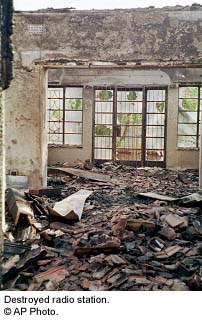 |
| Amani Trust, a Zimbabwean nongovernmental organization that documents cases of torture, has been threatened and harassed. Members of the clergy have been harassed and tortured for ministering to all Zimbabweans, regardless of their political affiliation. Civil society groups that seek to represent the legitimate grievances of a suffering population have been accused of treason. School teachers have been compelled to empty their classrooms and send their students to political rallies in support of the government. Headmasters have been instructed to inform on teachers who oppose the government; teachers have been compelled to inform on their own students. Leaders of the trade union movement have been arrested and tortured for exercising their constitutional rights to organize. | |
Cracking Down on the Freedom of Political Association
The intimidation of political opponents is a practice out of the darkest corners of Zimbabwe’s colonial and minority-rule history. A revolution dedicated to the freedom of all Zimbabweans to join and form organizations of their choice has been hijacked by a new form of authoritarianism. A movement that had as its core value the equality of all Zimbabweans without regard to race or national origin has been betrayed by President Mugabe’s creation of a new privileged class.
By 2000, the Movement for Democratic Change (MDC) emerged as a serious threat to ZANU-PF. Seeking to outmaneuver the loyal opposition, President Mugabe called for a constitutional referendum that would augment his powers and allow him to serve an additional 10 years. The people, however, soundly rejected the amendments to the constitution. Rather than respect the will of the people, ZANU-PF militias seized property owned by MDC supporters, burned hundreds of homes, and assaulted and tortured suspected opposition members. President Mugabe called these acts “peaceful demonstrations” and ordered the Zimbabwean police not to intervene on behalf of dissidents. In the 4 months prior to the June 2000 parliamentary elections, some 31 people were killed in political violence. Nonetheless, the MDC won nearly 50% of the seats in parliament and appeared poised to make additional gains in the 2002 presidential elections.

Knowing that the rank and file of the army and police would not turn against the people of Zimbabwe, the government unleashed ZANU-PF youth brigades and so called "war veterans" to intimidate, arrest and torture voters whom they believed intended to cast their ballots for the MDC. The "war veterans"–most of whom had no role in the liberation struggle–drew up lists of MDC supporters, their families, and people who did not cast their ballots for ZANU-PF. The war veterans and youth brigades hunted down the individuals on this list and perpetrated gross violations of human rights against them. Many of the targeted individuals were teachers, who on a number of occasions were beaten, tortured and harassed in front of their students. In one case, the war veterans beat a pregnant teacher whose husband voted for the MDC, resulting in the death of her baby. In many of these cases, the students fled the schools, and due to a lack of staff and students, as well as the overall chaos, some of these schools shut down and were converted by ZANU-PF into torture centers.
The government responded to the challenge of a loyal opposition by unleashing a wave of political violence unseen in Zimbabwe since the brutal repression in Matabeleland in the early 1980s, when North Korean-trained troops killed some 20,000 people and tortured thousands more. A campaign of personal plunder masquerading as "land reform" became the tool for the Government of Zimbabwe to steal, murder, abuse, and rape its people into submission.
The Diversion of Food Assistance, and the Assault on the Rural Economy
The food crisis in Zimbabwe is largely the creation of the government of President Mugabe. Despite this, members of the international community have responded to the suffering of the Zimbabwean people as food assistance pours into the country. International organizations and private groups have banded together to meet the needs of the Zimbabwean people, but face harassment and intimidation by government officials acting under the direct orders of the political elite. Officials who would prefer to see the hungry, particularly women and children, receive assistance solely on the basis of need have instead been coerced into denying food to those who exercised their inalienable rights as Zimbabweans. Social workers who have dedicated their lives to the service of all Zimbabweans have been forced into the service of a corrupt elite that uses food to reward its supporters and punish its critics.
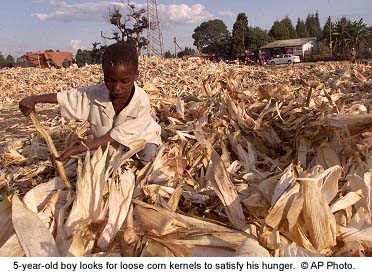
Most of the valuable farmland in Zimbabwe was owned by a small commercial farming community. While this community generated the majority of Zimbabwe’s foreign earnings, government revenue and rural employment, its claim to the land was based on the pre-independence prerogatives of a small elite. Land reform was a consistent demand of rural populations, and had broad domestic and international support. Initially following independence, funds from the national treasury and resources from abroad were used to acquire land, not for ordinary Zimbabweans, but rather for senior government officials and their families. When that money ran out, and after the senior officials had lined their own pockets, the Government of Zimbabwe unleashed a reign of terror aimed at the rural economy.
Instead of land reform, from 2000 onward, Zimbabwe got a land grab in which one privileged elite seized the land from another. Although it was done in the name of the people, in reality a politically elite group benefited at the expense of an entire nation’s rural economy.
The government’s land policies have been ruinously managed and used by President Mugabe as a tool for political and social oppression. The economic impact has been catastrophic. The tobacco industry, which dominates all other Zimbabwean exports, typifies the destructiveness of this "land reform." Prior to the implementation of farm invasions, the tobacco industry accounted for 25% of the world’s flue-cured tobacco and boasted a work force of more than 300,000 people.
 In 2002, tobacco production dropped from 216,000 tons during the previous year–itself a historically low figure–to as little as 70,000 tons projected for 2002/2003. At this rate, Zimbabwe’s tobacco industry will wither over the next 3 or 4 years. Tobacco is only one part of the larger and previously vibrant commercial farming industry in Zimbabwe. Until recently, commercial farming provided more than 600,000 people with jobs and was Zimbabwe’s largest source of employment. After January 2001, however, some 300,000 workers were laid off and their families had nowhere to go. In 2002, tobacco production dropped from 216,000 tons during the previous year–itself a historically low figure–to as little as 70,000 tons projected for 2002/2003. At this rate, Zimbabwe’s tobacco industry will wither over the next 3 or 4 years. Tobacco is only one part of the larger and previously vibrant commercial farming industry in Zimbabwe. Until recently, commercial farming provided more than 600,000 people with jobs and was Zimbabwe’s largest source of employment. After January 2001, however, some 300,000 workers were laid off and their families had nowhere to go.
The Theft of Opportunity
Zimbabwe is a developing nation, but it was not and should never have become a poor country. In the early days of President Mugabe’s rule, major strides were made in education, health care, housing and economic development. Jobs were created and filled by a new generation of Zimbabweans trained at home in first-rate schools and universities. Zimbabwe exported food and imported some of Africa’s brightest young minds. Today, Zimbabwe cannot grow enough food to feed itself and a bankrupt treasury cannot finance critical imports of food and fuel. Zimbabwe’s new generation of graduates has been forced to go abroad in search of economic opportunities. Those fortunate to still have jobs have seen the purchasing power of their salaries and savings decline dramatically. At the same time, President Mugabe, his wife and extended family, and his allies have expanded their private landholdings, traveled abroad in lavish style, and looted the national treasury.
Tragically, this has once again become the pattern of life in Zimbabwe. A small, wealthy elite steals from an impoverished majority, and uses the power of the state to terrorize all those who stand up in protest. 
"He is killing this country . . . Farming is the lifeblood of the economy, and we are on our knees."
- Black farmer from Harare
The United States has taken the following steps to act on political and humanitarian crises in Zimbabwe. It has:
- Delivered 216,840 metric tons of food relief to Zimbabwe in 2002, with additional food aid shipments underway.
- Cut off government-to-government assistance and is instead delivering humanitarian assistance through non-governmental organizations.
- Imposed travel restrictions on senior members of the Mugabe regime and others responsible for impeding Zimbabwe’s transition to a legitimate multiparty democracy.
- Repeatedly condemned President Mugabe for his circumvention of the democratic process, the manipulation of the delivery of humanitarian assistance based on party affiliation, and the violations of basic human rights and civil liberties.
- Provided Development Assistance and regional Economic Support Funds to promote democracy by increasing civil society’s ability to influence economic and political policy-making, especially in parliament and at local government levels.

Then and Now . . . The Tragic Decline of Zimbabwe
Zimbabwe has declined in nearly every single category since Mugabe came to power, and the situation has only grown worse as he has amended his policies and tightened his grip on Zimbabwe. The statistics leave no doubt about the future of Zimbabwe being disastrous as long as Mugabe remains in power.
|
| Fact/Statistic |
1982 |
1992 |
Estimate for 2002 |
|
People With
HIV/AIDS |
3% |
10% |
33.7% |
|
Unemployment
Rate |
13% |
35% |
80% |
| Exchange Rate |
$1 = Z$1 |
$1 = Z$2.5 |
$1 = Z$1,300 |
Number of People
Facing Starvation |
400,000 |
100,000 |
7.2 million |
People Living in
Poverty |
N/A |
25.5% |
75% |
Agricultural
Annual Growth |
3.5% |
2% |
- 12% |
Life Expectancy
(in years) |
51.8 |
41.35 |
37.7 |
| Source: IMF World Bank (2002) |
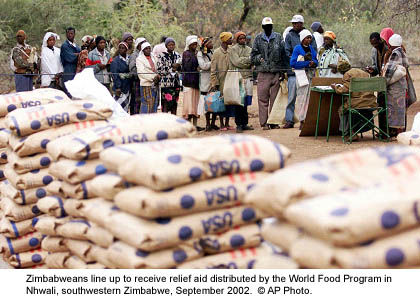
ZANU-PF Leaders In Their Own Words . . .
“We would be better off with only 6 million people [out of a total of 12 million], with our own people who support the liberation struggle (ZANU-PF)."
- Foreign Secretary of Mugabe’s ruling ZANU-PF party Didymus Mutasa |
“You are going to lose your jobs if you support opposition political parties in the presidential election. As civil servants, you have to be loyal to the government of the day. You can even be killed for supporting the opposition and no one would guarantee your safety.”
- Minister of Foreign Affairs Stanislaus Mudenge |
“We cannot continue to pay our enemies. People have to know which side of their bread is buttered.”
- Minister of Education, Sports and Culture Cde Aeneas Chigwedere |
“The action by the war veterans was their own initiative. It took us by surprise. Pleasantly, I might add.”
- President Robert Mugabe |
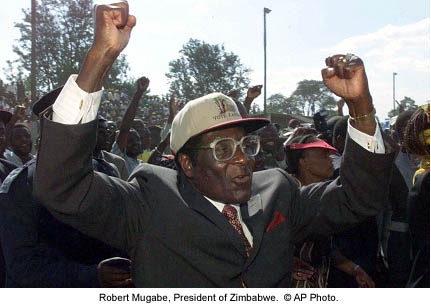
And the Words of the People . . .
"It feels sickening to have had a free Zimbabwe under black rule, and now to be deprived of all those rights that we fought so hard to win."
- Ephraim Tapa, President of Zimbabwe's Civil Service Union and a member of the General Council of the Zimbabwe Congress of Trade Unions (ZCTU) |
“The government has appeared to condone violence against journalists. This has created a climate of intimidation in the country . . . The rule of law is being undermined daily in Zimbabwe. It is not a healthy democratic situation.”
- Director of World Press Freedom Committee |
"The people will not get adequate infrastructure, financial support or training to cultivate the land productively. It is unfortunate that Mugabe is so scared of losing power that he will damage the environment and the economy just to stay in office."
- John Makumbe, a political science lecturer at the University of Zimbabwe |
“[What we] are against is the use of this exercise as a way of winning political mileage. Mugabe is saying that this is an empowerment of black farmers, but the reality is that it is only the well-connected and government officials who are benefiting from the redistribution.”
- Wellington Chibhebhe, Secretary General of the Zimbabwe Congress of Trade Unions (ZCTU) |

Related Electronic Resources
U.S. Department of State Web Sites
Bureau of Democracy, Human Rights and Labor
Bureau of Population, Refugees and Migration
Bureau of African Affairs
2001 International Human Rights Report: Zimbabwe, Bureau of Democracy, Human Rights and Labor
United States Embassy Harare
Additional Reading
The inclusion of non-U.S. Government web sites on this page should not be construed as an endorsement of the views contained therein.

The Daily News
International Crisis Group
Zimbabwe Human Rights NGO Forum
Human Rights Watch
Save the Children Fund - United States
United Nations, Humanitarian Affairs
Amnesty International
ZWNews.com
Lawyers Committee for Human Rights
"ZANU-PF and the government are still systematically using violence to punish the MDC and civil society, and compel them to accept the flawed election results. Food is becoming scarcer and with regional drought compounding the land seizure crisis, UN agencies warn of possible famine."
- International Crisis Group, 2002 Report on Zimbabwe
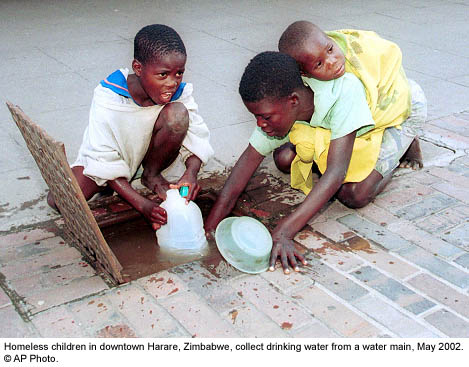
Department of State Publication 11018
Released March 12, 2003
|



